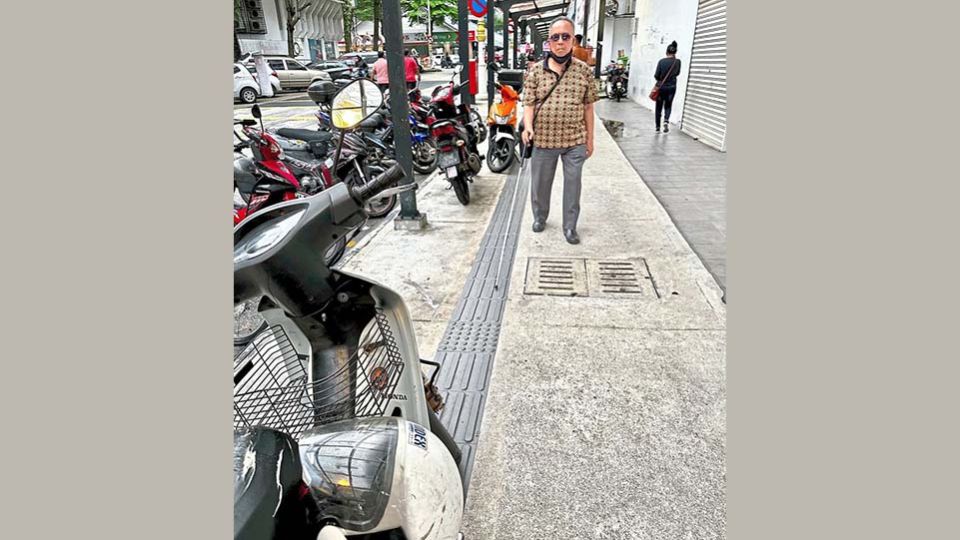April 16, 2025
KUALA LUMPUR – I NEVER truly grasped the severity of Kuala Lumpur’s drainage issues until I started taking my dog for evening walks.
Strolling past my own home, where I’ve lived for 20 years, I noticed something shocking – part of the drain near my house had been cemented over.
It was not done by Kuala Lumpur City Hall (DBKL), or for any public good, but by an individual who had sealed it up just so he could park his cars.
Suddenly, everything made sense.
The stagnant water. The backflow issues. The festering filth trapped beneath the surface. The mosquitoes!
But this isn’t just one selfish act – it’s a citywide epidemic.
The same mentality that leads people to cover up drains for their own convenience is the same one that sees public walkways hijacked for private business use.
Open any drain cover in this city, and you’ll see something just as infuriating –polypipes dumped inside, clogging up the drainage system.
Why polypipes? Because it’s cheap!
Some business owners even cut corners by installing polypipes directly into public drains, avoiding the cost and effort of building proper trenches to lay their water pipes.
This blatant disregard for regulations has turned our drainage system into a convenient shortcut, at the expense of public safety.
Drains meant for stormwater are now clogged with pipes, debris and makeshift plumbing, severely compromising their flood mitigation function.
The result? Choked drains, backflow and increased flood risks.
The authorities who claim to be tackling Kuala Lumpur’s flood problem seem to have overlooked this blatant sabotage.
But the selfishness doesn’t stop at the drains.
Our public walkways, even those with tactile blocks meant to assist the visually impaired, have been hijacked by businesses and motorists for their own benefit.
These tactile paths – designed to guide the blind safely – are now obstacle courses littered with tables, chairs, flower pots and even parked motorcycles.
A recent memorandum signed by more than nine disabled persons’ organisations, including the Independent Living and Training Centre Malaysia (ILTC) and the Malaysian Association for the Blind (MAB), revealed the grim reality in Brickfields, our so-called “OKU-friendly zone”.
Their accounts reported tactile paths blocked by trolleys, vehicles parked atop accessibility features, and public facilities grossly misused.
They cited clear violations of Malaysian Standard MS1184 for universal accessibility and urged DBKL to act, not just for disabled rights, but public safety too.
Their plea is simple: enforce the law and restore dignity and mobility to those who need it most.
Because this is not just about inconvenience; it is now a safety hazard.
We saw the devastating consequences of this selfishness just recently.
Visually impaired Annbarasi Nyanasekaran is now in a wheelchair after suffering a broken leg from tripping over a trolley left on a pedestrian walkway in Brickfields.
As the OKU groups pointed out, tactile paving becomes meaningless when traders treat it like a personal property, or when motorcycles and cars are parked right across it.
It is a mockery of inclusive design, not to mention a threat to life and limb.
And it is not just pedestrians who are at risk.
There are clear rules on public pathways and building accessibility, so emergency services can respond when lives are on the line.
Yet businesses flout these regulations.
When a fire breaks out and first responders cannot get through, who takes responsibility?
And what happens when a blocked escape route results in death?
When the disabled community themselves are forced to write to the mayor, describing Brickfields as a danger zone, you know something has gone terribly wrong.
Their memorandum is a stark reminder that accessibility isn’t a luxury. It’s a right. And ignoring it endangers everyone.
DBKL has plenty of rules but what good are they if they’re not enforced?
Businesses ignore the law because they know they can. Some even flash political letters or claim to have “special permission”.
Meanwhile, a woman has lost her mobility, floodwaters keep rising, fire hazards increase – and the public keeps paying the price.
How many more injuries, how many more flashfloods, how many more fire risks must we endure?
Kuala Lumpur is drowning in selfishness, not rain.
The rules exist.
The standards exist.
What we need now is the courage to enforce them.
DBKL must stop coddling offenders and start protecting the public.
No more excuses. No more warnings. Name and shame repeat offenders, remove obstructions and hold contractors accountable.
And until we tackle the rot of selfishness, no amount of infrastructure spending will save this city from going under.

